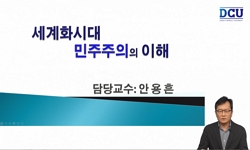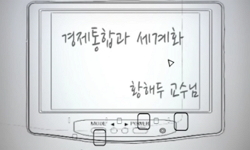세계화 시대는 개방성, 전체성, 보편성을 요구한다. 이러한 세계화의 추세가 일방적 획일화의 위험을 지니고 있다는 점을 모두가 우려한다. 하지만 세계화 흐름 자체는 현실적으로 거역할 ...
http://chineseinput.net/에서 pinyin(병음)방식으로 중국어를 변환할 수 있습니다.
변환된 중국어를 복사하여 사용하시면 됩니다.
- 中文 을 입력하시려면 zhongwen을 입력하시고 space를누르시면됩니다.
- 北京 을 입력하시려면 beijing을 입력하시고 space를 누르시면 됩니다.
부가정보
국문 초록 (Abstract)
세계화 시대는 개방성, 전체성, 보편성을 요구한다. 이러한 세계화의 추세가 일방적 획일화의 위험을 지니고 있다는 점을 모두가 우려한다. 하지만 세계화 흐름 자체는 현실적으로 거역할 수 없다. 따라서 세계화의 흐름을 거스르지 않으면서 동시에 획일화의 소용돌이에 함몰되지 않을 수 있는 자기 정체성 확립이 절실하다.
그렇다면 세계화 시대 다문화 상황에 적합한 자기 문화 정체성은 어떤 성격의 것이어야 하고 어떻게 모색해야할 것인가? 세계화 시대 다문화 상황에서 우리가 우려하는 문제는 개별 문화들이 배타적으로 자기 특성만을 주장하는 것, 다른 문화와의 ‘차이’를 인정하고 존중하지 않는 것, 그럼으로써 인류 공동체 전체가 문화적으로 조화와 공존을 이루지 못하는 상황이 점차 심화되는 것이다. 따라서 세계화 시대다문화 상황에서 우리 모두에게 절실히 필요한 것은, 긴밀하게 상호연결된 이 세상에서 차이 때문에 위협감을 느끼는 대신 자신이 커질 수 있다고 느끼는 법을 배우는 일이다. 세계화 시대 다문화 상황 속의 자기 문화 정체성 모색은 이러한 ‘차이의 존중’ 원칙을 토대로 이루어져야 할 것이다.
한국인의 전통적인 의식과 문화 안에는 서로의 다름을 배타적으로 구분하고 배척하기보다 전체적으로 모두를 포용하고 존중하려는 조화와 공존의 특성이 존재한다. 이러한 조화와 공존의 특성은 현대 다종교 상황에서 극단적 갈등과 대립 양상이 드러나는 것과 달리, 서로 다른 종교들 사이에 자연스러운 조화와 공존을 가능하게 했다.
이러한 한국의 전통적인 조화와 공존의 특성은 단순히 모든 것을 뒤섞어버리는 혼합주의를 의미하지 않는다. 또한 전체적인 대립과 갈등을 피하기 위해 인위적으로 개별 특성들을 손상시키거나 전체성 안에 개별 정체성을 함몰시켜버리는 방식으로 이루는 조화와 공존을 의미하지도 않는다. 한국인의 전통적인 조화와 공존 의식은 개별 정체성을 유지하면서도 그들 개별 정체성이 서로 갈등하고 대립하지 않는 것을 의미한다. 어느 하나에 의해 다른 것들을 일방적으로 획일화하지않고, 서로의 존재를 위협적인 대치 관계로 인식하지도 않고, 서로의 ‘차이’를 존중하면서 전체적으로 하나를 이루는 것을 의미한다.
세계화 시대 다문화 상황에 적합한 문화 정체성은 자기 독특성을 있는 그대로 드러내면서 동시에 전체적으로 다른 문화와 갈등 대립하지 않을 수 있는 것이어야 한다. 한국인이 전통적으로 지니고 있는 자연스러운 조화와 공존의 특성은 이런 세계화 시대 다문화 상황에 가장 적합한 한국 문화 정체성일 수 있는 것이다.
다국어 초록 (Multilingual Abstract)
The age of globalization demands openness, totality and universality, and there is a fear that it tends to impose a unilateral standardization process. Yet, in modern world, globalization is an inescapable fact of life. Indeed, modern societies are ch...
The age of globalization demands openness, totality and universality, and there is a fear that it tends to impose a unilateral standardization process. Yet, in modern world, globalization is an inescapable fact of life. Indeed, modern societies are challenged to find its cultural identity, conforming to the enormous wave of globalization, but not being drowned in it. Then what would be the appropriate form of cultural identity sound in the age of globalization and how is it to be found?
The age of globalization brings concerns over cultural pluralism: each cultural community attempts to assert its own uniqueness while not respecting other cultures nor recognizing their worth and differences, which may not contribute to harmony and co-existence of human society. What is, then, urgently asked of each cultural community is to learn to shake off fear of living with other cultures and to increase selfconfidence that each culture grows stronger in close and interdependent contact with other cultures. Any attempt to articulate cultural identity in the age of globalization must be based on the principle of ‘respecting differences among cultures.’
Traditional Korean thoughts and culture have the characteristic of harmony and co-existence that differences among each religio-cultural group have been well respected for the welfare of the entire society. This has made it possible various religions in religiously plural modern Korean society develop mutual trust and peaceful co-existence with each other, shunning extreme conflict and confrontation.
Such traditional Korean characteristic of harmony and co-existence does mean syncretism, an indiscriminate confusion of various religiocultural values. Nor does it imply that a uniqueness or identity of each religio-cultural group is sacrificed for the sake of harmony and coexistence, or the oneness of the entire society. Rather, it denotes that each religio-cultural group upholds its identity, while in peace with others. No one group dictates, nor regards others as a threat to its survival. It means becoming one while respecting ‘differences.’
Manifesting one’s own uniqueness and still not being in conflict nor confrontation with others should be the very foundation of the cultural identity most appropriate for culturally diverse modern human community in the age of globalization. Traditional Korean characteristic of harmony and co-existence may provide a key to quest for such cultural identity.
목차 (Table of Contents)
- 목차
- 1. 세계화 시대의 다문화 상황
- 2. 문화간 대립과 조화
- 3. 세계화 시대 다문화 상황 속의 자기 문화 정체성 모색
- 4. 한국 종교의 조화와 공존 의식
- 목차
- 1. 세계화 시대의 다문화 상황
- 2. 문화간 대립과 조화
- 3. 세계화 시대 다문화 상황 속의 자기 문화 정체성 모색
- 4. 한국 종교의 조화와 공존 의식
- 5. '조화와 공존'으로서의 한국 문화 정체성
동일학술지(권/호) 다른 논문
-
- 가톨릭대학교 인간학연구소
- 조긍호
- 2008
- KCI등재
-
- 가톨릭대학교 인간학연구소
- 한규무
- 2008
- KCI등재
-
- 가톨릭대학교 인간학연구소
- 양준석
- 2008
- KCI등재
-
- 가톨릭대학교 인간학연구소
- 이종진
- 2008
- KCI등재





 RISS
RISS







